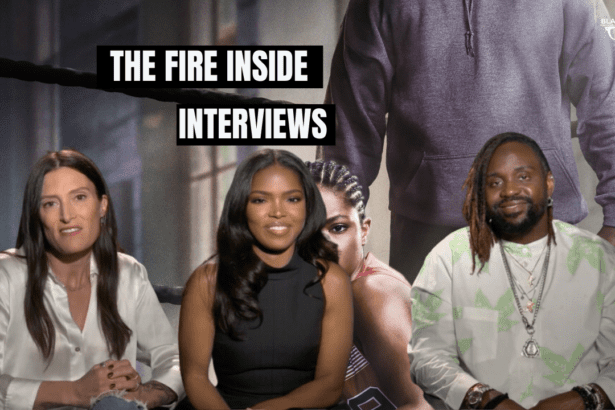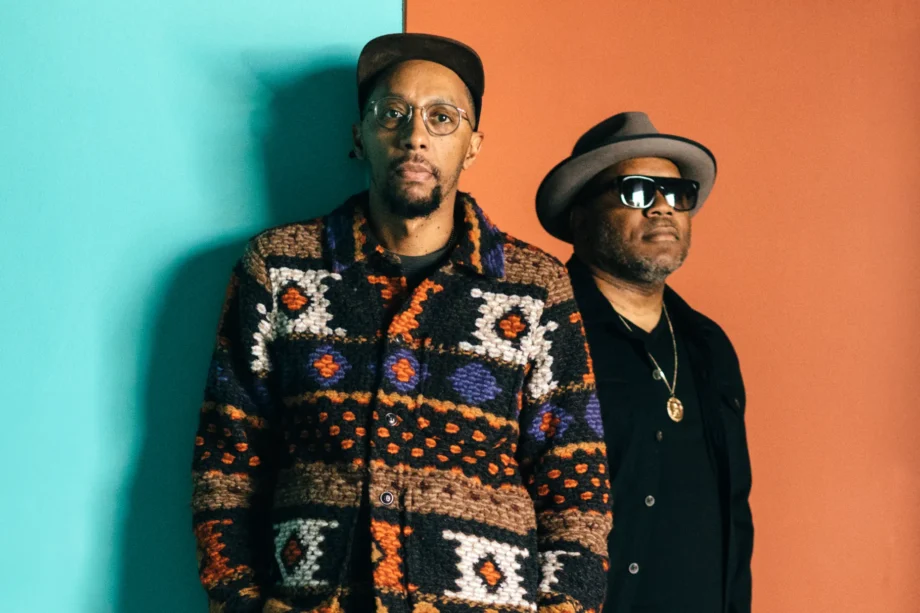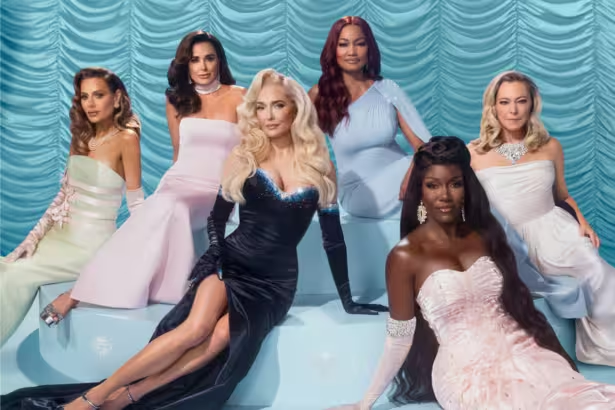Art, Beats + Lyrics is a touring urban art exhibition launched in Atlanta in 2004. From left, Founder and Producer Jabari Graham and Curator Dwayne “Dubelyoo” Wright. | Courtesy AB+L
ATLANTA, GA., HAS BEEN A NEXUS for African American art and artists for nearly a century since Hale Woodruff, Atlanta University’s first art teacher, envisioned and hosted an annual series that provided a platform for artists from around the country. The exhibition and juried competition, known as the Atlanta Art Annual, was held from 1942 to 1970.
A generation later, the National Black Arts Festival (NBAF) was founded by the Fulton County Arts Council in 1987 in the wake of a study commissioned by Michael Lomax, who was chairman of the Fulton County Board of Commissioners at the time.
NBAF reached across disciplines. Jabari Graham participated in the festival’s visual art programming, supporting his cousin by sitting in his booth to help sell his art. Crowds were everywhere, but hardly anyone stopped at the booth to consider his cousin’s work. Graham concluded that despite the popularity of the festival, it wasn’t reaching the audience with whom he identified—his peers who grew up on hip hop and engaged with art from an urban perspective.
In response, Graham established a new event, Art, Beats + Lyrics (AB+L). The urban art and music exhibition launched in Atlanta in 2004. Two decades after it was founded, a new documentary explores the untold story of how Art, Beats + Lyrics got started, how the show has evolved, and where it is today.
A confluence of visual art and hip hop culture, Art, Beats + Lyrics is a traveling road show featuring artwork displays and musical performances by emerging artists and more established figures. Some of the key elements of hip hop are the same characteristics that brought about Art, Beats + Lyrics: creativity, community, and entrepreneurship.
After graduating from Jackson State University, Graham returned home to Atlanta. Looking for opportunities in the job placement office at Atlanta University Center, he found out about an internship with Universoul Circus.
“Working with the circus, I learned a lot about marketing, promotions, budgeting, community engagement, and toured around the country. I’m seeing firsthand a blueprint of what I’m doing for ABL,” Graham said in the documentary. “They had a sponsorship deck and I flipped it to an AB+L deck. I didn’t have the event at the time so I’m just using images of what I think this show can be. Working for the circus was one of the best time of my life.”
To get Arts, Beats + Lyrics off the ground, Graham teamed up with Dwayne “Dubelyoo” Wright, an illustrator who has collaborated with hip hop magazines and streetwear brands. Graham is the producer and Wright serves as curator of AB+L. The urban art and music exhibition has transformed over the years, growing from a local gathering into a national tour.
Art, Beats + Lyrics is rich with music and plenty of art. The documentary chronicles the development of the art show and its rise from an ambitious concept to an enduring cultural phenomenon.
This brief 2021 video provides an introduction to Art, Beats + Lyrics, which is celebrating its 20th anniversary this year. | Video by Jack Daniel’s
TITLED ART, BEATS + LYRICS: The Untold Story of the Dopest Art Show in America,” the documentary was filmed in the lead up to AB+L’s 20th anniversary tour. To celebrate the milestone, the 10-city tour kicked off during Miami Art Week in Miami, Fla., in December 2023. After Miami, scheduled stops included Las Vegas, Indianapolis, Detroit, Houston, Atlanta, New York, Seattle, Los Angeles and New Orleans.
About 30 minutes into the film, Graham, young and in his 20s, is shown in a homemade video speaking directly to the camera about the roots of his idea and the concept for Art, Beats + Lyrics:
-
“My name is Jabari Graham. Myself and others, we created our show called Art, Beats + Lyrics. The main idea for Art, Beats + Lyrics is to get a younger audience involved with art appreciation at a level that we all can feel um it highlights urban art. What I mean by urban art is artwork that you see among the city, among the streets, among the walls, so uh with these local artists they really didn’t have a chance to you know get their artwork in galleries um or you know museums per se so we took that chance to highlight it the first show that we did was at the Five Spot in Little Five Points of Atlanta.”
Art, Beats + Lyrics is rich with music and plenty of art. The documentary chronicles the development of the art show and its rise from an ambitious concept to an enduring cultural phenomenon. At the conclusion, viewers see the show being installed and opening in Miami.
The film highlights the backgrounds of Graham and Wright and showcases the works and personal narratives of several artists who regularly participate in AB+L, including Lisette Correa, a mural artist and graphic designer; football player-turned-artist Shawn Stewart, aka Stu; and figurative painter Sydney James, co-founder of BLKOUT Walls Mural Festival in Detroit, Mich. Featured commentators include ABL host DRES tha Beatnik, Killer Mike, and Atlanta curator Karen Comer Lowe.
The full documentary is available at the bottom of this page and it is also streaming on Hulu. The film debuted at the NC Black Film Festival in Wilmington, N.C., where it was screened at the Cameron Art Museum on May 19. Meanwhile, the national tour continues. Next up, AB+L lands in Chicago on June 14 and then heads to Los Angeles on June 29. CT
FIND MORE about Arts, Beats + Lyrics on its website and on the Jack Daniel’s Tennessee Honey website, which sponsors the traveling urban art exhibition
FIND MORE about Dwayne “Dubelyoo” Wright on his website and Instagram
FIND MORE about Sydney James, Shawn “Stu” Stewart, on Instagram
FIND MORE about Lisette Correa on her website and Instagram
“Art, Beats + Lyrics: The Untold Story of the Dopest Art Show in America” showcases the 20-year journey of Jabari Graham and Dwayne “Dubelyoo” Wright, who lead and expand the annual urban art exhibition. Viewers meet several artists who open up about their lives and work; see the huge crowds that turned out for the second show presented at the High Museum of Art in Atlanta, Ga.; and learn about the ups and downs of the business side of producing the event. | Video by New York Magazine
BOOKSHELF
The exhibition catalog “Writing the Future: Basquiat and the Hip-Hop Generation” features contributions by Greg Tate, Carlo McCormick, Liz Munsell, Hua Hsu, and J. Faith Almiron. “Hebru Brantley” is the first monograph of Chicago-born Hebru Brantley. Known for his Flyboy character, Brantley’s work draws on the worlds of hip hop, pop culture, music, fashion, fine art, street art, and his early years as a graffiti artist. Several publications explore so-called “street art,” graffiti, and urban art, focusing mostly on a variety of cultures with some attention paid to the creativity of Black artists. “Art in the Streets” accompanied the first museum exhibition dedicated to street art, which was curated by Jeffrey Deitch at the Museum of Contemporary Art in Los Angeles. The catalog was first published in 2011 and re-published in 2021. Billed as “a survey the colorful history of graffiti and street art movements internationally,” the publication includes contributions by Greg Tate and Fab 5 Freddy, among others. Other volumes include, “Women Street Artists: 24 Contemporary Graffiti and Mural Artists from around the World” by Alessandra Mattanza, “Street Art Africa,” “The World Atlas of Street Art and Graffiti,” and “Graffiti and Street Art (World of Art).” Just published, “OSGEMEOS: Endless Story” is the first English language monograph of Gustavo and Otavio Pandolfo, Brazilian twins and widely celebrated urban graffiti artists known collectively as OSGEMEOS. The catalog accompanies “OSGEMEOS: Endless Story,” a new exhibition at the Smithsonian’s Hirshhorn Museum and Sculpture Garden in Washington, D.C., the artists’ first U.S. survey and largest U.S. exhibition to date. Also consider, “Hale Woodruff, Nancy Elizabeth Prophet, and the Academy,” which is co-authored by Amalia K. Amaki and Andrea Barnwell Brownlee.




